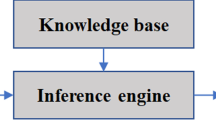Abstract
The emerging category of evolvable fuzzy systems has opened a new uncharted territory of system modeling by enhancing the capabilities of existing fuzzy models and formulating new methodological and algorithmic challenges and opportunities. In this study, we revisit the underlying concept and identify a number of essential optimization problems arising therein. It is shown that the behavior and characteristics of evolvable systems can be classified under the rubric of perception-based evolvability (being inherently associated with the human-centric systems and the development of efficient mechanisms of relevance feedback) and a distribution of knowledge representation resources of evolvable systems. We elaborate on the essence of these problems and define the corresponding optimization criteria. A selected detailed design scenario is presented as well in which the dynamics of information granules is exploited as a vehicle to cope with the evolving modeling environment.







Similar content being viewed by others
References
Akbarzadeh-T M-R, Davarynejad M, Pariz N (2008) Adaptive fuzzy fitness granulation for evolutionary optimization. Int J Approx Reason 49(3):523–538
Aliev RA, Guirimov BG, Fazlollahi B, Aliev RR (2009) Evolutionary algorithm-based learning of fuzzy neural networks. Part 2: recurrent fuzzy neural networks. Fuzzy Sets Syst 160(17):2553–2566
Alonso JM, Magdalena L, Gonzalez-Rodriguez G (2009) Looking for a good fuzzy system interpretability index: an experimental approach. Int J Approx Reason 51:115–134
Al-Razgan M, Domeniconi C (2006) Weighted clustering ensembles. In: Proceedings of 6th SIAM international conference on data mining, pp 258–269
Angelov P (2004a) An approach for fuzzy rule-base adaptation using on-line clustering. Int J Approx Reason 35(3):275–289
Angelov P (2004) A fuzzy controller with evolving structure. Inf Sci 161(1–2):21–35
Angelov P, Lughofer E, Zhou X (2008) Evolving fuzzy classifiers using different model architectures. Fuzzy Sets Syst 159(23):3160–3182
Antonelli M, Ducange P, Lazzerini B, Marcelloni F (2009) Learning concurrently partition granularities and rule bases of Mamdani fuzzy systems in a multi-objective evolutionary framework. Int J Approx Reason 50(7):1066–1080
Bandyopadhyay S, Giannella C, Maulik U, Kargupta H, Liu K, Datta S (2006) Clustering distributed data streams in peer-to-peer environments. Inf Sci 176:1952–1985
Beringer J, Hullermeier E (2006) Online clustering of parallel data streams. Data Knowl Eng 58:180–204
Bezdek JC (1981) Pattern recognition with fuzzy objective function algorithms. Plenum Press, New York
Bodenhofer U, Bauer P (2000) Toward an axiomatic treatment of interpretability. In: Proceedings of the 6th international conference on soft computing IIZUKA2000, pp 334–339
Bodenhofer U, Bauer P (2003) A formal model of interpretability of linguistic variables. In: Casillas J, Cordon O, Herrera F, Magdalena L (eds) Interpretability issues in fuzzy modeling, Springer, Berlin, pp 524–545
Bodenhofer U, Bauer P (2005) Interpretability of linguistic variables: a formal account. Kybernetika 41:227–248
Crespo F, Weber R (2005) A methodology for dynamic data mining based on fuzzy clustering. Fuzzy Sets Syst 150:267–284
Guha S, Meyerson A, Mishra N, Motwani R (2003) Clustering data streams: theory and practice. IEEE Trans Knowl Data Eng 15:515–528
Huang YP, Hsu CC, Wang SH (2007) Pattern recognition in time series database: a case study on financial database. Expert Syst Appl 33:199–205
Jain A, Murt M, Flynn P (1999) Data clustering: a review. ACM Comput Surv 31:264–323
Molina C, Rodríguez-Ariza L, Sánchez D, Vila MA (2006) A new fuzzy multidimensional model. IEEE Trans Fuzzy Syst 14(6):897–912
Montiel O, Castillo O, Melin P, Díaz AR, Sepúlveda R (2007) Human evolutionary model: a new approach to optimization. Inf Sci 177(10):2075–2098
Park NH, Lee WS (2007) Cell trees: an adaptive synopsis structure for clustering multi-dimensional on-line data streams. Data Knowl Eng 63:528–549
Park HS, Pedrycz W, Oh SK (2007) Evolutionary design of hybrid self-organizing fuzzy polynomial neural networks with the aid of information granulation. Expert Syst Appl 33(4):830–846
Pedrycz W (1998) Conditional fuzzy clustering in the design of radial basis function neural networks. IEEE Trans Neural Netw 9:601–612
Pedrycz W (2005) Knowledge-based clustering: from data to information granules. Wiley, Hoboken, NJ
Pedrycz W, Gomide F (2007) Fuzzy systems engineering. Wiley, Hoboken, NJ
Pedrycz W, Hirota K (2007) Fuzzy vector quantization with the particle swarm optimization: a study in fuzzy granulation–degranulation information processing. Signal Processing 87:2061–2074
Pedrycz W, Hirota K (2008) A consensus-driven clustering. Pattern Recognit Lett 29:1333–1343
Pham DT, Castellani M (2006) Evolutionary learning of fuzzy models. Eng Appl Artif Intell 19(6):583–592
Strehl A, Ghosh J, Cardie C (2002) Cluster ensembles: a knowledge reuse framework for combining multiple partitions. J Mach Learn Res 3:583–617
Tasoulis D, Vrahatis M (2005) Unsupervised clustering on dynamic databases. Pattern Recognit Lett 26(13):2116–2127
Zadeh LA (1997) Towards a theory of fuzzy information granulation and its centrality in human reasoning and fuzzy logic. Fuzzy Sets Syst 90:111–117
Acknowledgments
Support from the Natural Sciences and Engineering Research Council of Canada (NSERC) and Canada Research Chair (CRC) is gratefully acknowledged.
Author information
Authors and Affiliations
Corresponding author
Rights and permissions
About this article
Cite this article
Pedrycz, W. Evolvable fuzzy systems: some insights and challenges. Evolving Systems 1, 73–82 (2010). https://doi.org/10.1007/s12530-010-9002-1
Received:
Accepted:
Published:
Issue Date:
DOI: https://doi.org/10.1007/s12530-010-9002-1




